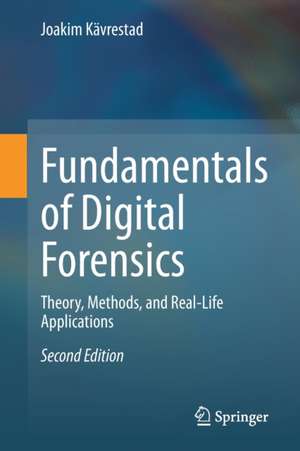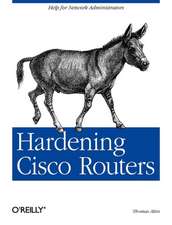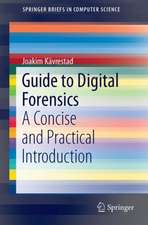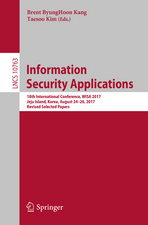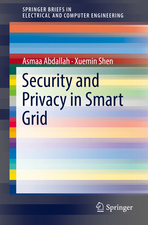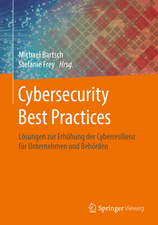Fundamentals of Digital Forensics: Theory, Methods, and Real-Life Applications
Autor Joakim Kävrestaden Limba Engleză Paperback – 20 mai 2020
This enhanced second edition has been expanded with new material on incident response tasks and computer memory analysis.
Topics and features:
- Outlines what computer forensics is, and what it can do, as well as what its limitations are
- Discusses both the theoretical foundations and the fundamentals of forensic methodology
- Reviews broad principles that are applicable worldwide
- Explains how to findand interpret several important artifacts
- Describes free and open source software tools, along with the AccessData Forensic Toolkit
- Features exercises and review questions throughout, with solutions provided in the appendices
- Includes numerous practical examples, and provides supporting video lectures online
Joakim Kävrestad is a lecturer and researcher at the University of Skövde, Sweden, and an AccessData Certified Examiner. He also serves as a forensic consultant, with several years of experience as a forensic expert with the Swedish police.
Preț: 360.20 lei
Preț vechi: 450.25 lei
-20% Nou
Puncte Express: 540
Preț estimativ în valută:
68.92€ • 71.97$ • 56.91£
68.92€ • 71.97$ • 56.91£
Carte tipărită la comandă
Livrare economică 15-29 aprilie
Preluare comenzi: 021 569.72.76
Specificații
ISBN-13: 9783030389536
ISBN-10: 3030389537
Pagini: 268
Ilustrații: XIII, 268 p. 143 illus., 27 illus. in color.
Dimensiuni: 155 x 235 x 21 mm
Greutate: 0.4 kg
Ediția:2nd ed. 2020
Editura: Springer International Publishing
Colecția Springer
Locul publicării:Cham, Switzerland
ISBN-10: 3030389537
Pagini: 268
Ilustrații: XIII, 268 p. 143 illus., 27 illus. in color.
Dimensiuni: 155 x 235 x 21 mm
Greutate: 0.4 kg
Ediția:2nd ed. 2020
Editura: Springer International Publishing
Colecția Springer
Locul publicării:Cham, Switzerland
Cuprins
Part I: Theory.- What Is Digital Forensics?.- Ethics and Integrity.- Computer Theory.- Notable Artifacts.- Decryption and Password Enforcing.- Part II: The Forensic Process.- Cybercrime, Cyber-Aided Crime and Digital Evidence.- Incident Response.- Collecting Evidence.- Triage.- Analyzing Data and Writing Reports.- Part III: Get Practical.- Collecting Data.- Indexing and Searching.- Cracking.- Finding Artifacts.- Some Common Questions and Tasks.- FTK Specifics.- Open-Source or Freeware Tools.- Part IV: Memory Forensics.- Memory Analysis.- Memory Analysis Tools.- Memory Analysis in Criminal Investigations.- Malware Analysis.- Appendix A: Solutions.- Appendix B: Useful Scripts.- Appendix C: Sample Report (Template).- Appendix D: List of Time Zones.- Appendix E: Complete Jitsi Chat Log.
Notă biografică
Joakim Kävrestad is a lecturer and researcher at the University of Skövde, Sweden, and an AccessData Certified Examiner. He also serves as a forensic consultant, with several years of experience as a forensic expert with the Swedish police.
Textul de pe ultima copertă
This practical and accessible textbook/reference describes the theory and methodology of digital forensic examinations, presenting examples developed in collaboration with police authorities to ensure relevance to real-world practice. The coverage includes discussions on forensic artifacts and constraints, as well as forensic tools used for law enforcement and in the corporate sector. Emphasis is placed on reinforcing sound forensic thinking, and gaining experience in common tasks through hands-on exercises.
This enhanced second edition has been expanded with new material on incident response tasks and computer memory analysis.
Topics and features:
Joakim Kävrestad is a lecturer and researcher at the University of Skövde, Sweden, and an AccessData Certified Examiner. He also serves as a forensic consultant, with several years of experience as a forensic expert with the Swedish police.
This enhanced second edition has been expanded with new material on incident response tasks and computer memory analysis.
Topics and features:
- Outlines what computer forensics is, and what it can do, as well as what its limitations are
- Discusses both the theoretical foundations and the fundamentals of forensic methodology
- Reviews broad principles that are applicable worldwide
- Explainshow to find and interpret several important artifacts
- Describes free and open source software tools, along with the AccessData Forensic Toolkit
- Features exercises and review questions throughout, with solutions provided in the appendices
- Includes numerous practical examples, and provides supporting video lectures online
Joakim Kävrestad is a lecturer and researcher at the University of Skövde, Sweden, and an AccessData Certified Examiner. He also serves as a forensic consultant, with several years of experience as a forensic expert with the Swedish police.
Caracteristici
Enhanced new edition featuring expanded content on corporate forensics (incident response and management), ethical issues, SQLite databases, forensic triage, and memory analysis Presents a strong theoretical discussion on forensic concepts and important considerations during a forensic examination Contains a detailed section that describes and discusses important artifacts Provides review questions and practice tasks at the end of most chapters, and supporting video lectures on YouTube
